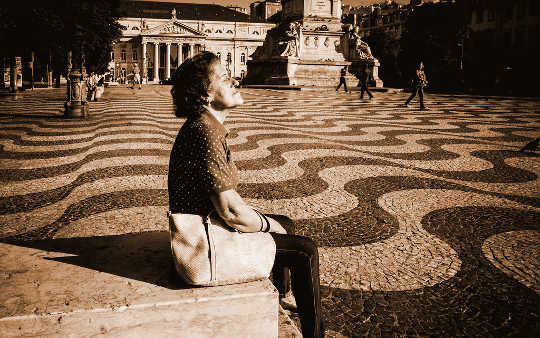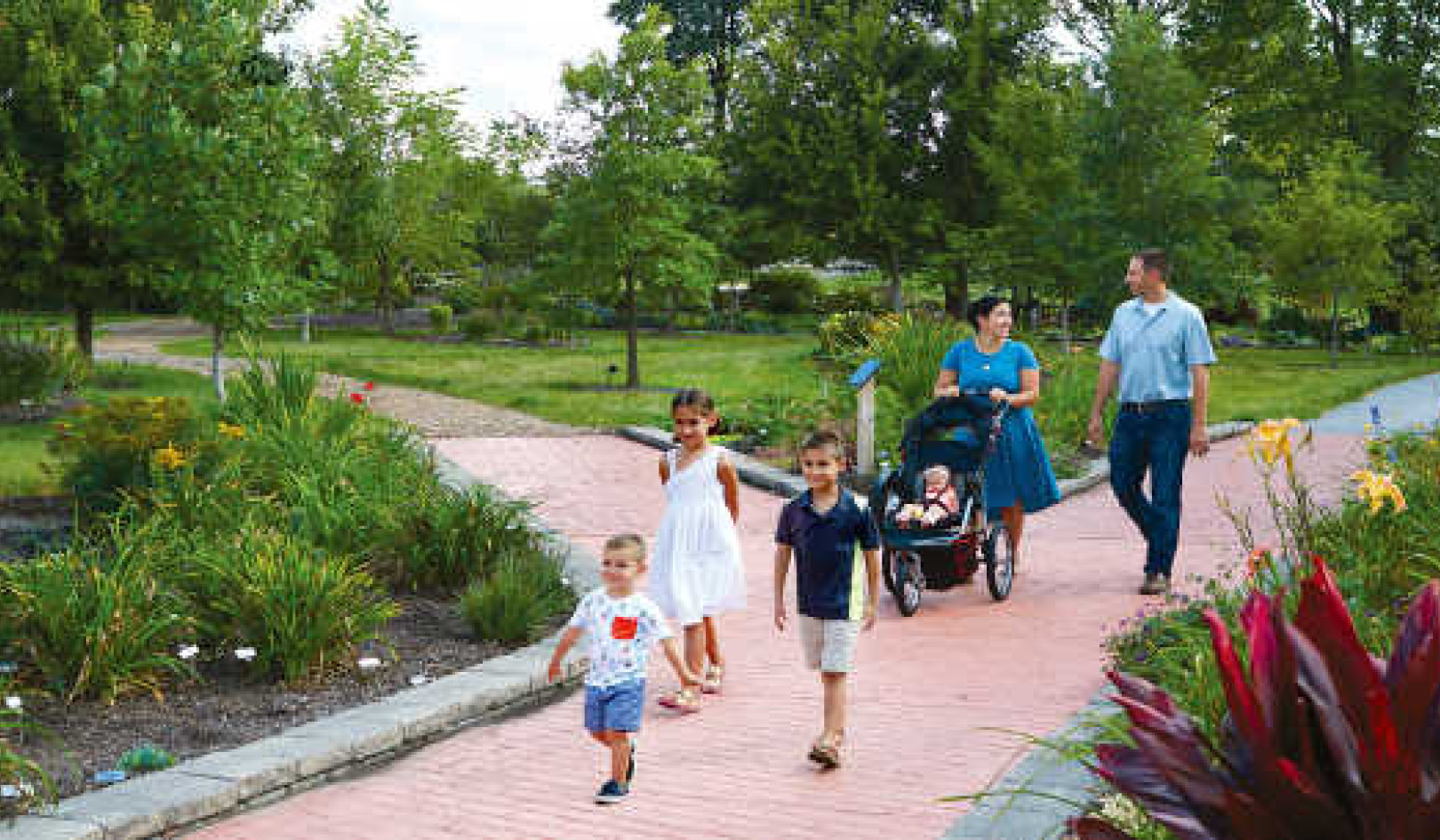
Photo Credit: Pedro Alves. (CC BY 2.0)
Some of us lead frenetic, fast-paced, busy lives, at a pace that is full steam ahead. Some of us lead purposely focused lives, filled with solitude and pragmatism. Some of us lead a life of service, whether it be to a job or a faith, our partners, our children, or other family members. Some of us lead lives disconnected from such webs, on our own thread, independent and not influenced by those norms.
Whatever life has been, Alzheimer’s changes it. It slows certain things down. It changes one’s ability to focus. It turns life review into a visceral recapitulation. We are not just reviewing our life in our thoughts, our brain and body are reviewing each developmental step we made in our life and physically shedding it. Yet at the same time, whoever the person has been, there is an essence that remains.
Alzheimer's: An Initiation Into A New Spiritual Path?
In many ways, the necessary transformation that a person with Alzheimer’s undergoes is akin to being initiated into a new spiritual path. The basic existential need to find answers will cause some individuals to consciously choose to join a religious group or order to find those answers. Some individuals experiencing the dementia process may display strong similarities to individuals who consciously choose a faith-based contemplative path and enter a cloistered monastery or convent. They are having a similar experience, although the causation is very different.
Consider the scope of change required to do that. You lay down your worldly possessions and work really hard for a period of time on multiple mundane tasks. Your spiritual commitment takes you away from family and friends with whom you love to spend time, to a meditation center and into the company of the spiritual order.
Once there, you have to stay really still for hours at a time in meditation, moving deep into the recollections of the past—sorting, forgiving, and letting go within the context of this present life, so that you feel completely resolved and at peace. You dispense with all mind-chatter and move into spaces in your meditation that you cannot articulate to others—places that make you feel so connected to the Divine that describing it doesn’t matter. As we know, there are individuals who make this kind of commitment. It is less common in the current era, but it does still occur at different places around the world.
“After one of my mother’s angry rants, a hospice worker asked her, ‘I see you are angry, and I wonder why?’ She said, ‘I am having a conversation with God, and people keep interrupting.’ (Hands on a pretend wheel.) ‘It’s like I am driving along with four passengers in the car, and I’m trying to talk to the person in the front seat, and the two people in the backseat keep talking over us.’” — Linda, Daughter
I want you now to imagine that you are an elder with dementia and have had a longing to follow a spiritual path, but your life took other turns and required other tasks. While these all felt very good and normal to you, you still need this opportunity to feel complete. For some people, the silence of dementia may allow this.
I have worked with individuals with dementia who have felt that they have moved into a deep place within and are working at another level in themselves without the mundane, the chatter. They are, in essence, “cloistered” by the experience of dementia.
Dementia: A Path to Serenity?
Many elders with memory loss who move into this spiritual phase begin with the usual vigorous denial and ego-engaging will strategies. Later, around Middle Stage, that changes and the person appears blissfully serene.
Illnesses resulting from anxiety melt away. Medication ceases for these maladies. The person no longer suffers from asthma, high blood pressure, and digestive disorders that were very physical and clinically documented—without the emotional stress triggered by their earlier coping methods, such problems disappear. They enter the present so fully that the cares and concerns that plagued them no longer have a handhold.
A kind of gentle gratitude starts to manifest, along with appreciation for others in daily interactions. Wrinkles disappear, and aging seems to recede—the youthful countenance conveying the presence of a timeless aspect of this person. They are known to smile insistently. Sitting on their own, their face still reflects this baseline of harmony. When someone interacts with them, the smile broadens.
Family members will comment that this is the happiest they have ever seen their mother. Or that their father is so positive and just wants to hug them or hold their hand.
Spouses sometimes experience this as well, but it tends to be a bit harder for a spouse. That’s because of all the personal work they have to do to assimilate what is different in their own reality and their own expectations and losses. At times, though, I see spouses make that leap and enjoy the time they spend with this person, feeling their peacefulness and letting it soak in.
Living In Two Realms
An elder in my facility has lived with us for six years. She initially wanted to leave and was convinced the highway to her home and spouse was right out there and that she needed to leave right now. A stroke had damaged her memory but her physical recovery went well, and she was active and capable with her daily abilities to dress, use the bathroom, shower, and so on.
She had lost about 10 years of time, and during that decade her husband had died. We have worked to help her adjust and have outlets for her energy and to validate her emotions regarding the changes. She had lived on the East Coast and could not integrate the fact that she now lives in the western United States and her spouse was no longer alive.
Slowly, she has transitioned to needing more assistance, which she has started appreciating. We have begun seeing this constant smile. She tends to look up a lot, and there are some visual perception issues that we work with to help her walk or eat, but she is incredibly peaceful.
Her son and his partner visit often and spend time with her, enjoying their time together. They are mindful that she is moving into a later stage and know that things will continue to change and that there may be some hard challenges ahead. But they are also aware of the spiritual quality that she emanates at this point. She is like a glowing angel resting in our reality. She has not made her transition yet, but there is something about her that feels as if she is fully accompanied on this side. When the time comes, there will be a release of the body but her spirit already lives in both places. We get the gift of that realm visiting us through her.
“It is said that Carl Jung would possibly regard the increase in dementia and autism as a compensatory function — balancing out the extreme we’ve found ourselves in, in our emphasis on linear thinking. The mind is loosening in a way that allows other faculties to manifest.” — Ellen, Geriatric Case Manager
Subtitles by added InnerSelf
©2015 by Megan Carnarius. All Rights Reserved.
Reprinted with permission of the publisher,
Findhorn Press. www.findhornpress.com.
Article Source
 A Deeper Perspective on Alzheimer's and other Dementias: Practical Tools with Spiritual Insights
A Deeper Perspective on Alzheimer's and other Dementias: Practical Tools with Spiritual Insights
by Megan Carnarius.
Click here for more info and/or to order this book.
About the Author
 Megan Carnarius is a registered nurse (RN), a licensed nursing home administrator (NHA), and a licensed massage therapist (LMT). Megan managed the first skilled memory care nursing setting in Boulder County, for 6-1/2 years. She served on the Alzheimer’s education committee for 15 years, and continues to provide trainings and lectures on all topics related to memory care. She is the executive director for Balfour Cherrywood Village, a secure memory care, assisted living residence for 52 elders that also provides adult daycare to participants from the surrounding community. She continues to provide training in massage and aromatherapy approaches for caregivers to draw upon in their care of individuals with dementia.
Megan Carnarius is a registered nurse (RN), a licensed nursing home administrator (NHA), and a licensed massage therapist (LMT). Megan managed the first skilled memory care nursing setting in Boulder County, for 6-1/2 years. She served on the Alzheimer’s education committee for 15 years, and continues to provide trainings and lectures on all topics related to memory care. She is the executive director for Balfour Cherrywood Village, a secure memory care, assisted living residence for 52 elders that also provides adult daycare to participants from the surrounding community. She continues to provide training in massage and aromatherapy approaches for caregivers to draw upon in their care of individuals with dementia.























